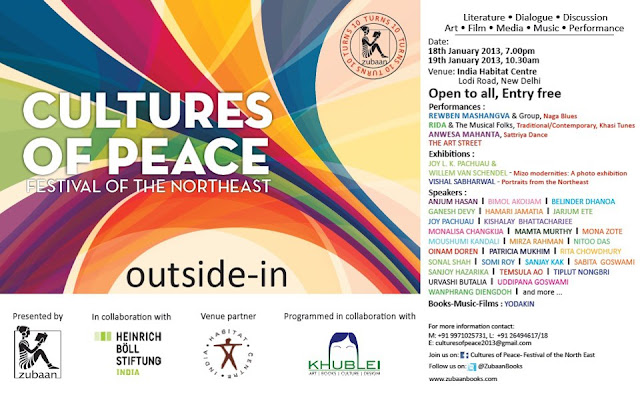Cultures of Peace — Festival of the Northeast 2013
18 Jan 2013, New Delhi: The second edition of the Cultures of Peace — Festival of the Northeast begins today at the India Habitat Center. This two-day festival is dedicated to two icons from the Northeast, Irom Sharmila (1972-) and the late Indira Goswami (1942-2011). It is organised by Zubaan, in collaboration with Khublei and Heinrich Böll Stiftung.
This evening, the festival kick started with a session on The Peripheral Centre, a lecture themed on The Northeast Identity - Then and Now. Patricia Mukhim, the editor of the Shillong Times, moderated the session and the guest speakers included Ganesh Devy, Kishalay Bhatacharjee, Sanjoy Hazarika and Temsula Ao. A musical performances by Ridah Gatphoh and the Musical Folks from Shillong and Rewben Mashangva and Group from Manipur followed the talk. There are more programmes coming up tomorrow.
(Rewben Mashangva performs with two old-timers, Vikram Chongtham and Ringo Golmei.)
The Peripheral Position
We have two identities when we are sober, especially when we talk about our collective life from a political perspective. The one imposed by the union of India and the other of the indigenous identity; and their combination is what marks the theatre of the absurd in a restless state like Manipur. A glaring conflict is occurring between these identities, as we can see from the armed movements in the entire region.
Liberals would tell us that the formation of identity is a developing process, but more conflicts lies in this thinking. There is a substantial room for argument that this disagreement developed only after the departure of the British from the Indian subcontinent.
This evening, the festival kick started with a session on The Peripheral Centre, a lecture themed on The Northeast Identity - Then and Now. Patricia Mukhim, the editor of the Shillong Times, moderated the session and the guest speakers included Ganesh Devy, Kishalay Bhatacharjee, Sanjoy Hazarika and Temsula Ao. A musical performances by Ridah Gatphoh and the Musical Folks from Shillong and Rewben Mashangva and Group from Manipur followed the talk. There are more programmes coming up tomorrow.
(Rewben Mashangva performs with two old-timers, Vikram Chongtham and Ringo Golmei.)
 |
| Image from the Facebook page of the event: Cultures of Peace - Festival of the Northeast |
The Peripheral Position
We have two identities when we are sober, especially when we talk about our collective life from a political perspective. The one imposed by the union of India and the other of the indigenous identity; and their combination is what marks the theatre of the absurd in a restless state like Manipur. A glaring conflict is occurring between these identities, as we can see from the armed movements in the entire region.
Liberals would tell us that the formation of identity is a developing process, but more conflicts lies in this thinking. There is a substantial room for argument that this disagreement developed only after the departure of the British from the Indian subcontinent.
Was the birth of post-colonial India a major reason of the identity crisis that plagues this region? Is the state doing enough, to put it bluntly, to strengthen the nation-building processes, excluding those phony peace talks? This evening’s talk failed to answer these questions. It was a short session and the guests had only spoken about their perception about identity, as in describing about the symptoms of the crisis. The futility of their views was so apparent because of their political correctness. Well, more identities would surface if we take into account the persisting ethnic problems, overlapping homeland demands, the unique histories and the like.
The Central Position
I always have a critical view about this kind of politically conforming events. First, the boring and overly formal speakers would explain about the problems in their long-winded approaches. Most of the time, their academician views are only as good as the number of students in a classroom. Second, they are nil, nix, null and nought if, if they speak against the government. Simply, they cannot afford to do. The reality is not always what conformity is.
Yet these are again entirely different when it concerns about the nation as a whole. After all it is the largest democracy of the entire universe. It does not suffer from mental disorder, unlike us, who have grown up in a democracy while living and dying in a military state, not knowing who we are. At the end of the day, the name of the festival gives us some hope. Yes, we want to live happy and calm and contented in the cultures of peace.

Comments
Post a Comment